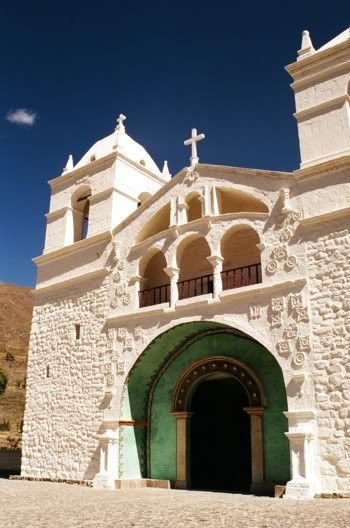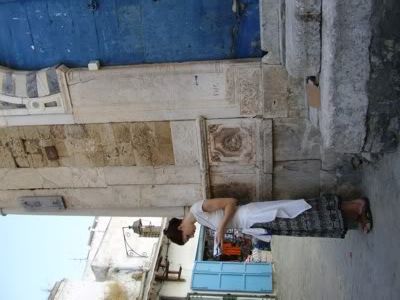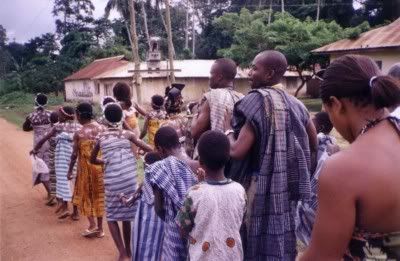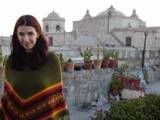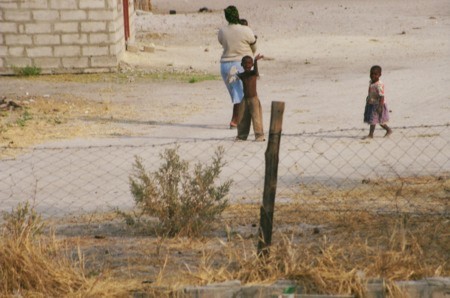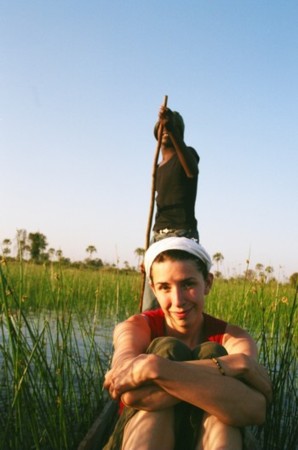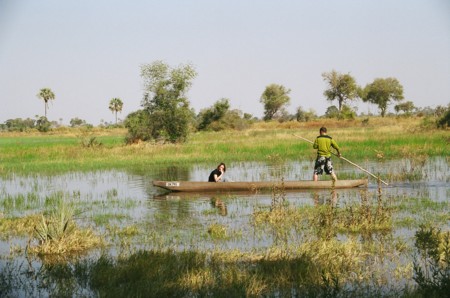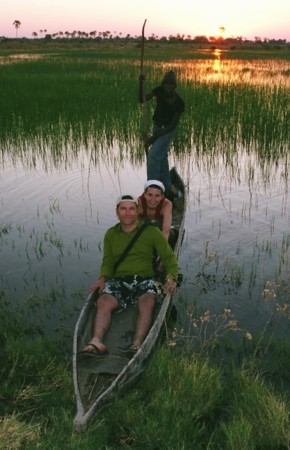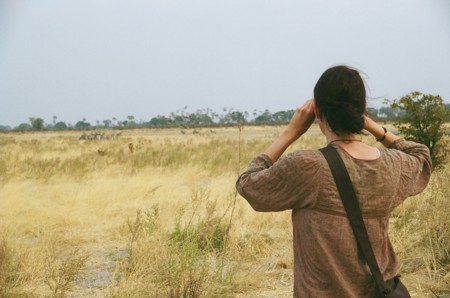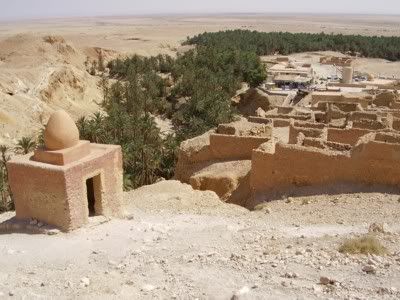 Dusty:Starlight:Culture
|
|
|
|
Into the Okavango
2004-10-03 6:49 p.m. Back to Africa for now. Day: 19 Time: 2:08 pm Date: August 14, 2004 Place: Maun, Botswana outskirts Journey: Into Okavango Delta, Mboma Island
On the ride out, through villages and dusty towns, half naked children ran after our car, or ran after their dogs running after our car. Everyone, and I mean everyone waived at us as we drove by, so unlike snobby South Africa or even fast-paced Maun, the rural surrounds seemed to be friendly and still – still enough to look at who the new strangers are who have decided to crash through your peace at an ungodly hour. Needless to say, the sun was barely up and by the time we got to the mouth of the delta, we were like little white popsicles. The wind tore at us mercilessly on the drive, and I kept wishing we could just somehow close the non-existent windows. Then, I said, aloud, maybe I could get my eyes and nose to stop watering and running. We’re not allowed to go into the Delta alone, so we had to hire a company and arrange a three day trip through them. We already got lectured about what to do if we see this and that animal, since on the island there are no organized campsites surrounded by fencing. It’s a good thing Christine took off for Nairobi, because hearing that, she’d probably make us drop her off at the nearest hotel for the weekend. On the ride out, I got stuck next to a blonde from California who decided it would be a good idea not only to talk politics, but to loudly defend W’s reasons for going to war, and explain that he’s “the best thing that ever happened to our country”. Well great. If the South Africans and European tourists all around us forgot, for a moment, all the stereotypes surrounding Americans when they met Steve and I, big-mouth over here just reminded them to remember. I try inching away from her, but she just won’t shut up. I feel like standing up and saying “I don’t like this girl either, and I apologize that she is annoying all of you. Please understand that many, many Americans are not loud and obnoxious, and are not so egocentric and egotistical that we never considered any other countries’ or the UN’s feelings regarding the war in Iraq.” Then she tells me loudly what an environmentalist she is – that she doesn’t eat meat and is very interested in protecting our natural resources. I could point out the obvious – that W. has single-handedly destroyed more of the Alaskan Wildlife Property than any other president in the last 20 years in the interest of making $$ -- but I don’t bother. I’m too tired, and I don’t want to talk to her at all. Yet she keeps on. Amazing! A personality disorder? Self-absorbed and unable to pick up on my body language and attempts at subtle social cues? I don’t have the gall to turn my back to her or to say “Please stop talking to me now.” Besides, I don’t know where she is going and whether or not she’ll be on our particular island or with our specific group or what. And the last thing I want in the middle of the Delta is drama with some nut-job, spoiled wealthy Republican from Southern California. I try a new approach – changing the subject to her extensive travels. But all she has to say about China is what she bought there – a thousand dollar jade bracelet with matching earrings – and all she has to say about her desire to go to Tanzania is that she really wants to get a piece of Tanzanite. I’m totally done at this point, make something up about feeling nauseous, and switch with Helen to get closer to the side of the truck. Poor Helen. Well I did make breakfast this morning before they were even out of bed. Once we arrive at the edge of the water, Steve wanders off to talk to the Australian guy who drove us out here, and Helen and I stand around Megan and Joe kind of confused about what to do. We know that we have to take Mokoros, two man dugout canoes, into the Delta, and that no motor boat or car could reach the island where we're planning on camping. We all have teeny, tiny bags with us - a few food items, equipment, and beers dispersed amongst our few bags. Oh, and bathing suits and toilet paper. We see a row of mokoros lined up, each with a serial number carved or stamped onto them, and a group of polers mingling with each other and laughing. They're in no rush, so Helen and I wander down toward the water. The Delta is sourced from the Okavango River, which starts in central Angola and then flows southeast across Namibia before entering Botswana. The Delta is flat - a 16,000 sq-km expanse of shallow lagoons, channels, and islands. The polers have to be licensed tour guides and transporters of locals, tourists, or even packages, and live outside the Delta. No one except for Zebras, giraffe, water buffalo, and the like live on the actual islands of the Delta themselves; these are national parks and have been preserved really well thanks to Botswana's stable government and investments in its own natural resources (which generate tourism and the big bucks). Slowly, we see there's a hierarchy to our group of polers/tourguides - there's an older man, Johannes, who is clearly in charge, a middle aged woman, Sarah, who's next in command, and then a group of indeterminate age who fall somewhere in the center. Then, there's Kelvin. About 18 years old, he approached Helen and I, grabbed our bags, and insisted we were in his boat for the entire journey. Helen smiled and said she thought "Thereeza (I love how Brits say my name) would probably like to go with her husband". Kelven's face fell, but fell even more when Steve and I were the ones who wound up in his boat, and single, pretty Helen wound up in Sarah's. We shove off from the shore with Steve and Kelvin chatting away - I think he had forgotten to be disappointed when he realized how cool Steve is. I lie back in the boat - I have just enough room to stretch my legs out flat, and feel a little water rushing in underneath me. This is common, but still makes me worry, especially because Gavin got me good and scared before we left Jo'burg when he called the Delta "momba country". Green Mombas, while dangerous, are not instantly deadly - those are the Black Mombas, which are far more common. Sigh. If too much water were to rush into the mokoro and it tipped over, we could easily walk through - the water's never so deep that the poles (they're long, but not that long) can't reach the bottom. So drowning is never really a concern, but Mombas, not to mention Puff Adders and the occasional angry angry Hippos are. I push those thoughts out of my head and lay back on Steve's legs. The sun coming up means we can shed our layers and we do, rocking the boat every time. After some initial chatter between the polers of our caravan of Mokoros dies down, there's nothing to listen to but the birds and gentle rush of water. The sun sparkles and glints across the water, and I watch the islands in the distance grow closer. Kelvin points out a heard of Water Buffalo gathering to drink on the shore of one island we pass, but I'm too distracted by the water lilies we keep brushing through to bother getting out my binoculars. Sarah and her mokoro, which happens to be carrying a fast-asleep Joe, are in front of us, and I watch her arms with amazement as she digs her pole into the ground, pushes off, and then with one graceful, fluid movement, brings the pole back around to continue propelling the mokoro forward. It's like a dance when our caravan, which I realized we were lucky to be at the back of, and the polers moving it are synchronized. I still can't believe somehow that I got here - still can't believe it's all real and that I just have to move an inch or two to feel the cool, clean Okavango Delta. We got a late start getting into the main channels of the Delta, since apparently our tour company didn't tell the local polers that we were coming today until we were half-way there. They scrambled to get some gear together since they would be on the island with us for the duration of our stay - by law, it can be no other way - and decided they needed to stop at their local village before heading out to Mboma Island. I was thrilled, though I think some of our fellow travelers were annoyed. I missed villages - staying in campgrounds or cities, far away from rural villages, is just the only thing really possible for travelers in Southern Africa, outside of those who happen to volunteer. But I missed the rural, village life we got to experience in Ghana. Though thousands of miles apart, and as distinctive and unique as can be, there’s something that unites I think all African countries, no matter how far apart they are, geographically or socio-economically. Maybe that “third world culture”? I was desperate for a glimpse inside a Central Botswanan village, and was happily surprised to be nearing one. The wealth of the group struck me immediately upon our approach - villagers had nicer bikes than I do at home, and cell phones proliferated. The homes where stealthy constructions of brick, stone, and mud - but not the generic, Habitat-for-Humanity kind. Roads weren't paved but were nicely shaped; I didn't see telephone lines but knew that the flatness of Botswana meant that the cell tower in miles-off Maun worked well enough. A television blaring somewhere replaced the ubiquitous radio normally blaring in the African Village. Nonetheless, the "third world culture" reigns supreme - many people still seemed to wear their shoes until they were thoroughly done, until the holes in the top got too big or the soles so worn down that they were painful to walk in. We might call having a nice cell phone but a ratty pair of shoes "mixed-up priorities", but I'm starting to realize that's what people mean by "third world culture" - conscious, voluntary choices, a way of living and making decisions. The local tour guide Johannes, for example, makes more money per year than University-educated, Fluent-English Speaking, white Gavin does back in South Africa, but won't buy a new pair of pants until his old ones literally fall apart. Meanwhile, Gavin probably has 20 pairs of pants, including a couple he just never really wears, some of which might even have the tags on them still (don't we all?). There's nothing like a month, a week, a day, or even an hour in an African Village to make you feel wasteful, greedy, materialistic, and just down-right silly for viewing material possessions the way you do and for considering clothes and shopping entertainment. Kelvin pointed out his home, and Steve and I stomped up and down the dusty paths that wound around homes and out to the main road for a while. Once back and nearing the water, we were struck by a god-awful smell, one that made me gag when it first hit me. “Come,” Helen said, “our friends’ neighbors have killed a Buffalo”. The smell and sight was dizzying – I got down to the water, where the buffalo was, just as someone was hacking its head off with a machete. The skin around the face had been peeled back, and the muscles in the animal's face – and near its eyes, ew, ew, ew, were exposed. Veins and arteries spilled out yellow, white, and red goo as another person got to work an the animal’s hind quarters. I had about enough and didn’t want to embarrass myself or Steve, or Helen, Joe, or Megan for that matter by vomiting, so I quickly turned to head back to the Mokoros and wait for the guides to gather their things. Who do I almost run smack into? The Blondie republican from California, Ms. Bush-loving vegetarian-environmentalist herself. She follows me back to the boats, squawking about how wrong it is that they’re cutting up this bull and blah, blah, blah. “I think it’s hard to get tofu around here,” I snap. I can’t help myself. I’m still feeling a little sick from the smell, and just can't deal with anyone right now. So the Cali couple are going to camp near us, I find out, but put the info out of my head because in the end, I really just don't care. Once back into the boats, we glide along the low water, brushing past reeds and willows, watching Zebra graze along shore lines we pass and listing to baboons call to one another. I get sleepy, but fight to stay awake since I don't want Joe to see - I can't very well keep making fun of him for sleeping before if I do so also. But there's a gentleness, a calmness to the Delta that's unlike anything I've ever felt anywhere else. I hum to myself and feel Steve put his arms around me from where he's sitting at the back of the boat. Once we reach Mboma island, we unload and set up camp. We've finished and now are just relaxing. We're going to eat in a bit, and then go on a walking safari with Johannes. A few brave souls have said they'd like to go swimming later - I trust Johannes to know where it's Ok to do so, but I'm not exactly excited about the idea given that puff-adder lecture we got before we left Maun. Steve talked Kelvin into lending him his Mokoro - he's poling Helen around close the shore as I write this. I might have some tea and then take a nap - I need to be ready to run, or not run, maybe even climb, depending on what animal we might run into today out in the plains of this island. xo.
|
||
